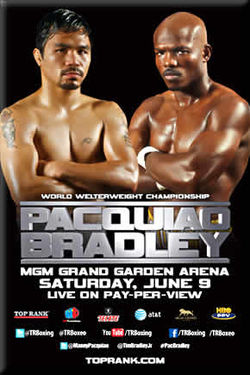Hammond, Indiana – An intellectual property attorney for J & J Sports Productions, Inc. (“J & J Sports”) of Campbell, California sued Sheila M. Kikalos individually and d/b/a Valla Del Sol a/k/a Villa Del Sol of Merrillville, Indiana in the Northern District of Indiana alleging the illegal interception and broadcast of Manny Pacqiao v. Timothy Bradley, WBO World Welterweight Championship Fight Program (the “Program”), which was telecast nationwide on June 9, 2012.
(“J & J Sports”) of Campbell, California sued Sheila M. Kikalos individually and d/b/a Valla Del Sol a/k/a Villa Del Sol of Merrillville, Indiana in the Northern District of Indiana alleging the illegal interception and broadcast of Manny Pacqiao v. Timothy Bradley, WBO World Welterweight Championship Fight Program (the “Program”), which was telecast nationwide on June 9, 2012.
J & J Sports states that it is the exclusive domestic commercial distributor of the Program. It has sued Sheila M. Kikalos individually and d/b/a Villa Del Sol, under the Communications Act of 1934 and The Cable & Television Consumer Protection and Competition Act of 1992.
Specifically, Kikalos has been accused of violating 47 U.S.C. § 605 and 47 U.S.C. § 553 by displaying the Program without a commercial license on the day of its broadcast. Regarding the claim under 47 U.S.C. § 605, the complaint alleges that with “full knowledge that the Program was not to be intercepted, received, published, divulged, displayed, and/or exhibited by commercial entities unauthorized to do so, each and every one of the above named Defendants . . . did unlawfully intercept, receive, publish, divulge, display, and/or exhibit the Program” for the purpose of commercial advantage and/or private financial gain.
A count of conversion is also included in the complaint. It asserts that the alleged acts of interception and exhibition were “willful, malicious, egregious, and intentionally designed to harm Plaintiff J & J Sports” and that, as a result of being deprived of their commercial license fee, J & J Sports suffered “severe economic distress and great financial loss.”
As there appears to be no separate legal entity, the lone defendant is Kikalos, who has been named both individually and doing business as Villa Del Sol. As an individual, J & J Sports asserts that Kikalos is responsible for the alleged unlawful activity, contending that she had the right and ability to supervise the activities of the establishment. J & J Sports asserts that the activities that she supervised included the unlawful interception of Plaintiff’s program. J & J Sports contends that Kikalos specifically directed the employees of Villa Del Sol to unlawfully intercept and broadcast Plaintiff’s program at Villa Del Sol and Grill or, if she did not, that the actions of the employees of Villa Del Sol are directly imputable to Kikalos by virtue of her purported responsibility for the activities of the restaurant.
J & J Sports further asserts that Kikalos as an individual specifically identified on the liquor license for Villa Del Sol, had an obvious and direct financial interest in the activities of Villa Del Sol.
In the complaint, the intellectual property lawyer for J & J Sports listed the following counts and requests for redress:
• Count I: Violation of Title 47 U.S.C. § 605. For this count, J & J Sports requests (a) statutory damages for each willful violation in an amount to $100,000.00 pursuant to Title 47 U.S.C. 605(e)(3)(C)(ii), and (b) the recovery of full costs, including reasonable attorneys’ fees, pursuant to Title 47 U.S.C. § 605(e)(3)(B)(iii).
• Count II: Violation of Title 47 U.S.C. § 553. For this count, J & J Sports asks the court for (a) statutory damages for each violation in an amount to $10,000.00 pursuant to Title 47 U.S.C. § 553(c)(3)(A)(ii); (b) statutory damages for each willful violation in an amount to $50,000.00 pursuant to Title 47 U.S.C. § 553(c)(3)(B); (c) the recovery of full costs pursuant to Title 47 U.S.C. § 553 (c)(2)(C); and (d) and in the discretion of the court, reasonable attorneys’ fees, pursuant to Title 47 U.S.C. § 553 (c)(2)(C).
• Count III: Conversion. For this count, the court is requested to order both compensatory and punitive damages from Defendants as the result of the Defendants’ allegedly egregious conduct, theft, and conversion of the program and deliberate injury to J & J Sports.
Practice Tip #1: While on the surface this appears to be a copyright case, an allegation of interception under 47 U.S.C. § 605 is a different cause of action from copyright infringement. However, a suit alleging interception does not preclude an additional lawsuit alleging different causes of action. For example, the copyright holder can also sue for copyright infringement, which could increase damages by as much as $150,000.
Practice Tip #2: As part of its complaint, J & J Sports claims that the Kikalos’ actions have subjected them to “severe economic distress and great financial loss.” It will be interesting to see what evidence it offers as proof that, as a result of allegedly not receiving its full commercial fee for the programming purportedly displayed by the Kikalos – a circumstance, if true, presumably known to few other than the Kikalos herself – it has suffered severe economic distress and great financial loss.
The case was filed by Charlie W. Gordon of Greene & Cooper LLP. The case was assigned to Judge Theresa L. Springmann and Magistrate Judge John E. Martin of the Northern District of Indiana and assigned Case No. 2:14-cv-00195-TLS-JEM.
 Indiana Intellectual Property Law News
Indiana Intellectual Property Law News

